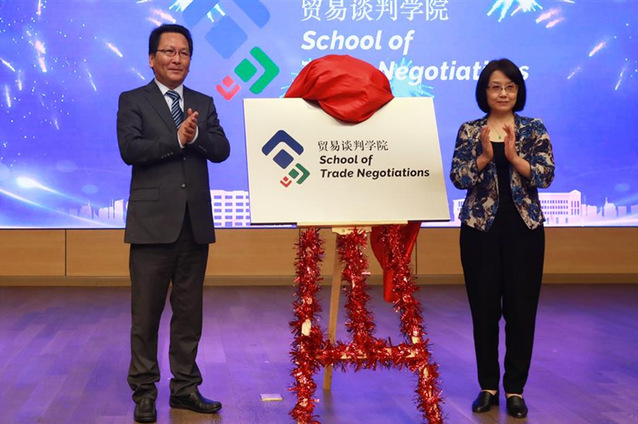
Zhu Guohong (left), president of the Shanghai University of International Business and Economics, and Shang Yuying, director of the Shanghai Commerce Commission, unveil a plaque for the new trade negotiation school.
China's first trade negotiation school founded in SUIBE on Wednesday( 11th Octobe, 2017) to cultivate more professional negotiators for the country.
Zhu Guohong, president of the Shanghai University of International Business and Economics, said it addressed a major shortage of experts in trade negotiation and dispute settlement in China.
There are few Chinese experts in international organizations. Only an estimated 10 Chinese work with the World Trade Organization and 450 in agencies affiliated with the United Nations — accounting for about 1 percent of the total.
This shortage forces China to spend large sums of money to hire European or American lawyers when disputes happen, with Chinese lawyers limited to playing a supporting role.
“It is a sharp contrast to the fact that China is now the second largest economy in the world, with growing international influence,” Zhu said. “And one of the reasons for the situation is that China had no special school for trade negotiations.”
He also said the school would invite international experts and Chinese government negotiators, as well as leading experts in global trade and investment to teach and conduct research.
Zhou Hanmin, a leading political adviser and legal expert in Shanghai, has been appointed honorary dean of the new school.
“Sixteen years have passed since China joined the WTO and the country has developed from a mere follower of international trade rules to one of the rule makers,” Zhou said.
“China now urgently needs high-end practical talent with global vision and fluent foreign language skills, who are familiar with both China’s conditions and international trade rules and negotiating skills.”
The new school will start with a bachelor’s program in international trade and investment rules and will admit the first class of 30 students next year. In the near future, it will train both bachelors and masters in various areas, in Chinese, English and French.
The school will produce graduates in five specialist areas: bilateral or regional negotiations; for multilateral negotiations in international organizations; working with international organizations; international dispute mediators and arbitrators: and lawyers specializing in international law.
It will also cooperate with international organizations, such as the WTO, World Bank, the International Monetary Fund, the Organization for Economic Cooperation and Development, the World Intellectual Property Organization, Asian Infrastructure Investment Bank and the BRICS Bank.
Students will also have chance to study in schools abroad and take internships in international organizations.
